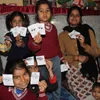How this NGO helped people and animals in distress during the pandemic
Bengaluru-based Humanity United Together (HUT) came forward to help families affected by the pandemic with ration kits and offered other forms of support. The NGO also ensured dogs and stray animals didn’t go hungry during the lockdown.
As India fights the COVID-19 pandemic, NGOs across the country have been working relentlessly to help those affected. With limited resources, these organisations have helped the underprivileged sections of the society by providing relief materials.
Despite the challenges, NGOs and volunteers came forward risking their lives to keep the spirit of humanity alive.
Humanity United Together (HUT), a volunteer-driven NGO from Bengaluru, is also helping a number of families affected by the pandemic.
The organisation was started in 2016 by a group of seven engineering students from Bengaluru – Adil Hamza Khan L, Rishabh Jain, Haneefa Nida, Priyanka C, Roushan Meraj, Aaron Geoffrey, and Prerana Reddy P.

HUT Paatashaala's event at Gauribidnooru Government School, Karnataka
Initially, they pooled in whatever they could to visit charitable organisations like Anand Ashram, Kidwai Cancer Memorial Hospital, and Holy Faith Orphanage in the city. They also made necessary donations based on the requirements like food packets, essentials, etc.
“While these visits were our main activities during the initial years, we had moved apart for some time to stabilise in our careers. We united again in 2020 to aid the pandemic cause,” says Lubna Rehman, who heads the social media team, Prachaar, at HUT.
HUT was officially registered as an NGO in 2021 to provide relief to different communities.
Uniting humanity for a cause
During the pandemic-induced lockdown in 2021, around 60 student volunteers from nearly 12 universities across Karnataka came together as part of HUT’s relief work and distributed ration kits and fed the stray dogs who had no access to food.
The ration kits were sufficient to provide for a family of three to four for about a month. The team distributed these kits to about 150 families across the city during the pandemic, and has been doing that since May.
“We provided about 30 underserved families in DG Halli, Bengaluru, with rations and sanitary napkins since May 2021. We also conducted awareness programmes around menstrual health within this community. We are going to start with other awareness programmes soon,” says Lubna.
Lubna shares that abandoned dogs, cats, and the strays had a difficult time as the restaurants, which usually feed the leftovers to these animals, were closed during the lockdown.
“We provided food to stray animals on a regular basis locality-wise. We also provided food and rations to pet shelters overburdened by abandoned pets,” she says.
In addition, the team also collected blankets for stray animals to protect them during the monsoon and the subsequent cold weather in the city.

A volunteer from the NGO feeding the stray dogs
During the peak of the second wave, the team arranged hospital beds, oxygen cylinders and refills, and medication, among others, for the families impacted by COVID-19. “We are also providing counselling to COVID patients and their families,” says Lubna.
Apart from COVID relief work, HUT is also spreading awareness about afforestation, deforestation, and the importance of growing trees for the future. It organised a seed ball dispersion event, which were thrown around in certain sparse areas of Lalbagh in April 2021.
Seed balls, also known as earth balls or Nendo Dango, consist of a variety of different seeds rolled within a ball of compost.
“If at least 10 percent of them grow, then that is a huge achievement,” says Lubna.
The team
The HUT team is divided into four factions – Paatshaala, Saathi, Anveshna, and Prachaar. The NGO’s work is executed under each of these verticals by the volunteers.
Paatashala aims to provide knowledge and awareness to underprivileged children.
“In February, we visited the Gauribidanur School in Bengaluru rural and encouraged reading habits in children. We also conducted some games for them so that we could build some hope among them,” says Lubna.
On the other hand, the volunteers at Saathi are spreading awareness on mental health and wellness for timely diagnosis of mental illnesses. Psychology students are the main volunteers of this faction, where they conduct sessions and help people understand their mental health condition.
“The Saathi volunteers also reached out to the families who lost their loved ones and helped them through difficult times,” says Lubna.

HUT's seed ball dispersion event
Anveshana, HUT’s fact-checking authority, does a complete background check of the event location, needs, requirements, etc. The volunteers also provide verified information about available beds, oxygen cylinders, and others with the help of some of the volunteers who were UPSC aspirants.
Lastly, Prachaar is the social media team of HUT, which is in charge of keeping its followers up-to-date on events and activities. In fact, Lubna is one of the core members of this team.
“I met people from varied backgrounds and cultures and got an opportunity to manifest and develop my personal skills in a better way. With the networks I developed, I look forward to work with the team and help the cause,” says Aishwarya Patil, one of the volunteers.
Madeeha Chowdhary, another volunteer, says, “Though I have been associated with other NGOs, I really liked HUT’s approach. The team is friendly and enthusiastic to serve the society.”
Impact
The HUT team has so far reached out to over 150 families by providing monthly rations. The volunteers also provide food for about 40-60 dogs about two to three times a week.
In order to meet these requirements, the team pooled in their own money and also received some donations from well-wishers. The team also organised a charity bake sale through which they were able to raise funds for ration kits for about 20 families.
“It has been a gratifying, self-fulfilling, privileged work with the people who’re nothing less than an extended family to me,” says P Prerana Reddy, Chief Coordinator, Anveshna.
However, the biggest challenge for the team was the movement, because while it may be a good cause, they might be putting people at risk.
HUT is now preparing for the third wave of the pandemic in the coming months. The team is looking to conduct more awareness campaigns with video conferences and other engaging activities to protect people from the third wave.
“Now, with most of us having been vaccinated, we want to visit Kidwai Cancer Memorial again because the joy that we experience with them is unmatchable,” says Lubna.
Edited by Megha Reddy


![[COVID Warriors] How Vrikshit Foundation is aiding the underserved during the pandemic](https://images.yourstory.com/cs/5/98c65090592f11ea9f62339ce853ca75/Imagepwzq-1622785393979.jpg?fm=png&auto=format&h=100&w=100&crop=entropy&fit=crop)





